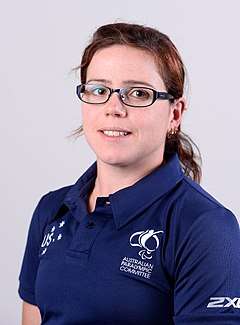Jodi Elkington-Jones
Jodi Elkington-Jones (born 17 May 1993) is Australian athlete who has cerebral palsy. She represented Australia at the 2012 Summer Paralympics and has also competed in two Commonwealth Games, winning gold in the 2014 Games in the F37/38 long jump. She represented Australia at the 2016 Rio Paralympics in athletics.[1]
 2016 Australian Paralympic Team portrait of Elkington | |
| Personal information | |
|---|---|
| Nationality | Australia |
| Born | 17 May 1993 Wodonga, Victoria |
| Sport | |
| Country | Australia |
| Sport | Athletics |
| Event(s) | 100 m, 200 m, Long Jump |
| Club | Wodonga Athletics Club |
Medal record
| |
Personal
Elkington was born on 17 May 1993[2] in Wodonga, Victoria.[3][4] At the age of eighteen months, she was diagnosed with cerebral palsy[5] and this effects her mobility on the right side of her body.[2][4] Her cousin is runner Jarrem Pearce. Elkington went to school at Wodonga South Primary School.[2] Outside of athletics Elinkton enjoys netball, umpiring games.[2] She married Warrick Jones in May 2015.[4][6]
Athletics
Elkington is a T37 classified athlete competing in 100 m, 200 m and long jump events.[2][7] She is a member of the Wodonga Athletics Club.[4]
She first became involved in Paralympic sport in year six when her school teacher Leon Price convinced her to try swimming.[5] She represented Victoria at a State level for three years but was forced to give up swimming after injuries to her right elbow that required corrective surgery.[5] Elkington started competing in athletics in 2008, following a 2007 Australian Paralympic talent search event.[2] She became a member of Wodonga Athletics Track and under local coach, Greg Simpson she was selected to represent Victoria at the Pacific School Games in Canberra in 2008.[5]
She first represented Australia at the 2010 Commonwealth Games. In the T37 100 m race, she finished fourth with a time of 15.08.[2][8][9] While there, she had health issues related to the food. She was Australia's only elite athlete with a disability at the Games.[2] At the 2011 Australian Athletics Championships, she finished second in the 200 m event.[10] She competed in the 2011 IPC Athletics World Championships in four events with her best result being fourth in the Women's 400 m T37.[2] She competed in the 2012 Australian Athletics Championships.[7] With a time of 70.42 seconds, she won the 400 metre event.[2][3][7][11][12][13]
Prior to the 2012 London Paralympics, she was an Australian Institute of Sport (AIS) scholarship holder and was coached by Iryna Dvoskina. Elkington finished 6th fastest in the Women's T37 400m at the 2012 London Games with a time of 1:11.49. She also placed 4th with the rest of her team in the Women's 4 × 100 m Relay – T35/T38 class.[14]
After the London Paralympics, gave up athletics for a short period due to the pressures of being an AIS athlete.[15] At the 2014 Commonwealth Games in Glasgow, she won the gold medal in the Women's Long Jump T37/38.[4]
At the 2015 IPC Athletics World Championships in Doha, she finished fifth in the Women's Long Jump T37 and twelfth in the Women's 100 m T37.[4]
At the 2016 Rio Paralympics, she won the bronze medal in the Women's Long Jump T37 with a jump of 4.30m.[16]
In 2015, she lives in Sydney and is a New South Wales Institute of Sport scholarship holder.[17]
Notes
- "Australian Paralympic Athletics Team announced". Australian Paralympic Committee News, 2 August 2016. Archived from the original on 9 April 2019. Retrieved 2 August 2016.
- "Jodi Elkington | APC Corporate". Australia: Australian Paralympic Committee. 2012. Retrieved 13 July 2012.
- Chris Dutton (6 June 2012). "Canberra's Paralympic athletes aim for Games glory". Canberra Times. Australian Capital Territory. Archived from the original on 29 August 2017. Retrieved 9 July 2012.
- "Jodi Elkington". International Paralympic Committee Athletics prifiles. Retrieved 28 October 2015.
- "Jodi Elkington special guest at Australia Day celebrations". Cowra Guardian. 21 January 2015. Retrieved 28 October 2015.
- "Wedding announcement". Border Mail. 2 May 2015. Archived from the original on 13 September 2015. Retrieved 28 October 2015.
- "World Records Fall at Australian Athletics Championships | IPC". International Paralympic Committee. 20 July 2012. Retrieved 24 July 2012.
- Sydney (20 April 2010). "Australian C'wealth Games athletics team named". The Age. Melbourne. Retrieved 16 July 2012.
- "Quick wins bronze in rapid pistol pairs –". ABC Goulburn Murray – Australian Broadcasting Corporation. 8 October 2010. Retrieved 24 July 2012.
- "Patmore closes Nationals with victory". Australian Paralympic Committee. 17 April 2011. Archived from the original on 9 July 2012. Retrieved 24 July 2012.
- "Walters sprints for London — Teenager set for Paralympics debut". Canberra Times. Canberra, Australia. 7 June 2012. Retrieved 8 July 2012.
- "The Australian Paralympic Committee (APC) announced the athletics team for the London 2012 Paralympic Games at the Queensland Sport and Athletics Centre today, during the team's final training camp on home soil before the Games begin on 29 August". 2XU. Retrieved 24 July 2012.
- "Australian Paralympic Team Announced". Athletics ACT. 6 June 2012. Archived from the original on 29 November 2012. Retrieved 24 July 2012.
- "Archived copy". Archived from the original on 8 September 2012. Retrieved 8 September 2012.CS1 maint: archived copy as title (link)
- Worrall, Brad (29 July 2014). "Commonwealth Games 2014 | Jodi Elkington supporters in world of tears after she beats the odds". Border Mail. Retrieved 28 October 2015.
- "Jodi Elkington-Jones". Rio Paralympics Official site. Archived from the original on 22 September 2016. Retrieved 15 September 2016.
- "Athletics team selected for worlds". New South Wales Institute of Sport News. Archived from the original on 4 March 2016. Retrieved 28 October 2015.
External links
- Jodi Elkington-Jones at Australian Athletics Historical Results
- Jodi Elkington-Jones at the Australian Paralympic Committee
- Jodi Elkington-Jones at the International Paralympic Committee (also here)
- A Commonwealth Champion (2015)- Documentary